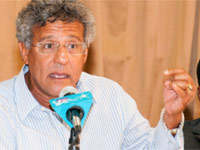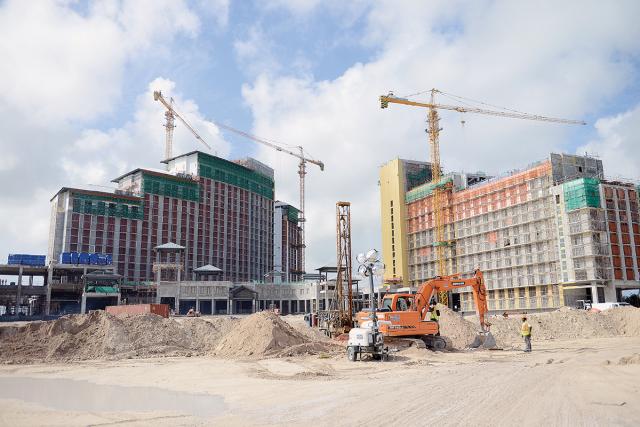Mr. Speaker,
I rise to Table a Resolution meant to garner the position and sense of the representatives of the people on the proposed Resort development by Baha Mar at Cable Beach, New Providence and to ensure that the Bahamian people are fully informed on the requirements, consequences and benefits which are projected to result for The Bahamas if the development proceeds as now proposed by the principals.
The Baha Mar project is to comprise six hotels with approximately 3,500 rooms and condominiums, an approximately 100,000 square foot casino, 200,000 square feet of convention facilities, a twenty acre beach and pool experience, an 18-hole golf course and a 60,000 square-foot retail village and additional residential products.
The total value of the project is estimated at $2.5 billion. A contract for the amount of $1.918,965,693 billion has been negotiated with the China Construction Company as primary contractors for the project.
The Resolution results from the fact that the foreign labour component intended during the construction of the Resort exceeds levels ever experienced in The Bahamas and is beyond anything ever contemplated by my Government.
In the earliest of times in the development of the tourism sector in our country in the 1950s the law and the Government permitted as much as 25% of the labour force in construction and or operation of a tourism development resort to be foreign. The Hotels Encouragement Act 1954 permitted “for the admission into The Bahamas of key personnel and special workmen both during the construction period and operation of the new hotel, subject to the proviso that at all times seventy-five per centum of the total number of persons employed in the construction or operation of the new hotel shall be natives of The Bahamas if such natives of The Bahamas are available to perform the several and respective services required.”
While that provision remained in the law, following Majority Rule a move toward Bahamianization of the work force brought change.
Beginning in the 1980s the practice evolved where large foreign components were engaged in the construction of hotels, and a smaller number of foreigners were allowed to work in the hotel upon completion.
Honourable Members will recall the substantial foreign work force engaged to construct the Crystal Palace Resort and casino, today the Wyndham Crystal Palace Resort and the US Departure Terminal at the then Nassau International Airport. At those two projects Indian, Brazilian and other foreign nationals far out-numbered Bahamian nationals on the work force.
When my Government first came to office in 1992 we determined not to continue this practice of the former Government. When, in 1993 we agreed terms for the commencement of a Five Phase redevelopment and Expansion of Resort Properties on Paradise Island by Sun International (now Kerzner International) we established that notwithstanding the demonstrable need for the engagement of large numbers of expatriate experts and labour for the timely completion of the project, the ratio of Bahamians to non-Bahamians on the construction site would not exceed 30% foreign to 70% Bahamian, increasing on the required Bahamian component above the 1954 statutory base of 25%.
It is noteworthy that this ratio obtained during Two Phases of construction of the Kerzner International resorts under FNM administrations and was continued when Members Opposite most recently formed the Government during the Third Phase expansion of Kerzner International on Paradise Island. (70% Bahamian : 30% Foreign)
Members Opposite at the same time however, did not require an adherence to this accepted ratio of Bahamian to foreign workers in the construction of the Bimini Bay Resort at North Bimini. As a result foreign workers, principally from Mexico, far exceeded the number of Bahamian nationals engaged on that construction site in the middle of the last decade.
The Bahamas Government now has for consideration the construction of the Baha Mar Resort in Cable Beach. The terms of the funding obtained by the developers of the Resort include a requirement that the overwhelming majority, if not virtually all of the workers to be engaged on the “Core Project”, over the life of the project, be foreign workers – some 8,150 persons.
It is projected that some 1,200 Bahamians will be engaged in the construction of the non-Core project that is, the new West Bay Street, the new Commercial Village and the initial site preparation for the Core Project. More specifically these projects include:
Construction of a new West Bay Street/Corridor including utilities with a value of $75 million
Construction of a new Commercial Village at Cable Beach and related “back of house” on Gladstone Road with a value of $30 million
Construction of free standing buildings including the golf clubhouse and buildings around the beach and pool area and retail village with a value of $20 million
Major earthwork, irrigation and landscaping related to the construction of the new Golf Course with a value of $10 million.
I have been advised that the principals of Baha Mar are in discussion with their Chinese partners and financiers with a view to additionally, engaging Bahamian contractors in a number of “trade packages” related to the Core Project to include general site clearing and preparatory work, masonry, dry wall, ceilings, painting, electrical, mechanical, site security, fencing, beach restoration, remediation, and landscaping having a total estimated value of $40 million.
It is further expected that many of these jobs will carry over to continued employment in the “trade packages” for the Core Project I mentioned. This we are informed is expected to result in the engagement of 3,300 Bahamians at the height of construction of the Core Project.
Honourable Members are aware that the basic justification for permitting the engagement of foreign workers in The Bahamas has been the transfer of technology and of skills. This occurred, very measurably, during each phase of the Kerzner International developments on Paradise Island and is occurring now, at the first phase in the expansion of the Lynden Pindling International Airport.
Based on the numbers, in the case of the Baha Mar Project it is proposed that 71% of the work force will be foreign and 29% Bahamian. This represents a complete reversal of conditions imposed upon Kerzner, for example.
What must be determined is whether this invaluable benefit of skills transfer and improved exposure to new technologies can or will occur in a project where contact between Bahamians and foreign experts is likely to be limited.
I also believe that the Government has an obligation to explain to the Bahamian people other requirements of The Bahamas unrelated to labour issues which arise from this project. Principally this will involve the transfer of Government-owned and Crown Lands to the developers. Because of the conditions precedent set by Baha Mar’s financiers – China Import Export Bank and the China Construction Company – these lands are required to be transferred in advance of the start of construction of the project.
As you are aware, the Cable Beach Hotel, now the Sheraton was transferred to Baha Mar in 2005.
The Crystal Palace Resort and Casino, now the Wyndham Crystal palace, was acquired on leased land by Baha Mar in 2005. That hotel, like the Nassau Beach Hotel, is constructed on leased Crown Land.
Approval for the Baha Mar Project requires the transfer of the following publicly-owned land:
Wyndham Hotel & Casino Land 13.450 acres
Nassau Beach Land 7.546 acres
Hobby Horse Hall parcel 70.964 acres
Fidelity Bank .866 acre
Cecil Wallace-Whitfield Centre 2.259 acres
Cable Beach Police Station 1.377 acres
Old West Bay Street 11.228 acres
New Corridor #7 1.610 acres
Plus an additional parcel of
.783 acre
Gladstone Road back of House 50.00 acres
Prospect Ridge Parcel 2.365 acres
Water and Sewerage Corporation 99.782 acres
Parcel
BEC Parcel 2.570 acres
BEC Substation .165 acres
264.965 acres
It is the position of my Government that these lands will only be transferred for the expressed purpose of facilitating the development and that should the development not proceed the land must return to the Government.
Mr. Speaker,
I should also advise that a number of unresolved matters between Baha Mar and Scotia Bank relating to outstanding loans attached to the Baha Mar Project are being negotiated even now. It is expected that all outstanding matters will be resolved within the next two week period. Hence, it is proposed that we reserve our debate of the matter until these matters have been completed.
It would appear that the Wednesday 22nd or Thursday 23rd September may be an appropriate time for the debate.
Mr. Speaker,
To be very explicit, so that the noise in the print and broadcast media to the effect that somebody is holding up this project can be put to rest – Baha Mar cannot do the deal with the Chinese bank until it satisfies the Scotia Bank loan.
They are in discussions with Scotia Bank. The next meetings take place next week in Toronto. But there will be no deal unless Scotia’s loan is satisfied.
Secondly, there will be no deal unless the Government of The Bahamas and the Chinese Government exchange letters saying “we approve in The Bahamas”, and we get from the Chinese Government at the same time in the next hand, “we approve here [China].”
They will go ‘hand go, hand come’ – at the same time and the same place.


